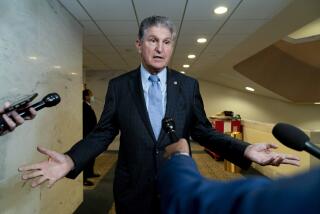Income Tax Increase Not Ruled Out, Bush Aide Says : Budget: A statement by Sen. Dole is disavowed. Everything is still on the deficit negotiating table, the White House contends.
- Share via
KENNEBUNKPORT, Me. — The White House on Monday disavowed an influential Senate Republican’s statement that President Bush has ruled out income tax increases as part of a deficit reduction deal.
“He’s not made any assurances on anything. Everything is on the table and open for discussion,” White House Deputy Press Secretary Alixe Glen said, responding to questions about a statement made by Senate Minority Leader Bob Dole of Kansas.
Dole had said on a television interview program Sunday that Bush is “not going to raise personal income tax rates . . . . He’s not going to go along with that.”
When asked if that statement reflected Bush’s views, Glen said: “No. I think that’s Sen. Dole’s personal prediction . . . . Right now, there is nothing that is ruled out or ruled in.”
Bush is at his vacation home here preparing for back-to-back meetings that begin Thursday in London when North Atlantic Treaty Organization leaders convene and continue Monday in Houston with the heads of the major industrial nations.
The back-and-forth on income taxes is part of the continued political posturing that began last week when Bush formally abandoned his campaign pledge of “no new taxes” and conceded that “tax revenue increases” are needed to narrow the government’s growing deficit.
Many Democratic leaders have insisted that, if taxes are going to be raised, the bulk of the new revenues should come from upper-income taxpayers who benefited most from the tax cuts of the Ronald Reagan years.
The Democrats’ chief target has been a quirk of the tax laws known in legislative jargon as the “bubble,” under which many middle-income taxpayers face a top marginal tax rate of 33%, while the richest Americans pay only 28% on income that exceeds the bracket covered by the “bubble.”
Meanwhile, conservative Republicans, in revolt since Bush abandoned his anti-tax promise, have declared that they will oppose any move to change income tax rates.
The White House and GOP leaders have been trying to placate both groups, tossing hints to the conservatives that income tax rates are off limits but assuring Democrats that everything is up for negotiation. The theory behind the strategy is that, if Bush is forced to accept an income tax hike, his aides will be able to tell conservatives that they tried to fend off the increase but, in the end, had to give in.
Currently, government accountants expect the deficit for the fiscal year beginning Oct. 1 to be roughly $160 billion, not counting the cost of the savings and loan bailout. If those costs are included, the deficit would be well over $200 billion.
Unless current budget-balancing laws are changed, Bush will be required to order across-the-board cuts of $100 billion or more in government programs.
To avoid those cuts, Bush and Democratic leaders will have to reach a deal to change existing law. Both sides say that the deal envisioned probably would reduce the deficit by about $50 billion, roughly half from tax increases, the other half from spending cuts.
Such a deal would still leave a substantial deficit, but officials say that any larger cut would throw the economy into a recession.
Numerous proposals for tax increases and spending cuts have been circulating around Washington for weeks, but White House aides and congressional staff members say that budget negotiators still are weeks away from reaching agreement.
More to Read
Get the L.A. Times Politics newsletter
Deeply reported insights into legislation, politics and policy from Sacramento, Washington and beyond. In your inbox twice per week.
You may occasionally receive promotional content from the Los Angeles Times.











